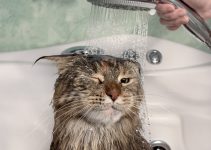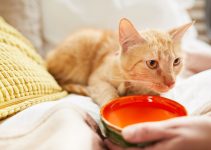Cats are lovely creatures, and as pet parents, we worry about them and monitor their daily actions. Sometimes, when cats have a health problem, we can notice it through many symptoms, and most times, their feces are the most precise way to learn if our cats have a health problem. Cats usually use the litter box for number two at least once a day, and if they are healthy, their poop would be deep brown, not too hard, not too soft, and it would not smell too strong.
Our cats, just like humans, can suffer from constipation as well, for various reasons related to their health. There have been many natural treatments suggested, in addition to prescribed medications by the vet, one of them is olive oil. What are the benefits of olive oil for cats? How can we provide it for our cats? How can it help with their constipation? And what are the uses of olive oil for cat constipation?
NOTE: We want to inform our blog readers that before we publish any article, the team “Proudcatowners” does deep research based on experience and knowledge about cats and everything related to them, to guarantees reliable and precise information, satisfy the readers is our first priority.
Is it okay to use Olive Oil For Cat Constipation?
Even though many pet parents try to avoid giving their cats any human food, it is not the case for olive oil. And the majority agrees that it is okay to feed your cat olive oil, it is nutritious and healthy, as long as it is given in moderation. As much as it is considered beneficial for humans, it is also very helpful for cats, and it is regarded as an excellent supplement for their diet.
Not only is olive oil not non-toxic for cats, but it is also considered a superfood! So, whenever you want to prepare a homemade meal for your cat, for example, cooked or raw chicken, olive oil is a great ingredient to add to those.
What makes olive oil a superfood for my cat?
Olive oil constitutes of unsaturated fatty acids. It has both poly and monounsaturated fats. In addition to that, saturated fats make up only 14 % of the total fat count in olive oil. Another thing that makes olive oil great is that it has omega 9 fatty acid which is oleic acid, omega 6 fatty acid, which is the linoleic acid, and the omega 3 fatty acid, which is the alpha-linoleic acid.
These fatty acids are essential for your cat’s health. In addition to this wide range of fatty acids, olive oil also contains vitamin E and vitamin K. These vitamins, alongside the wide range of antioxidants, work on maintaining healthier body cells through the process of proliferation. Lack of vitamin K in your cat’s body can lead to osteoporosis. Vitamin K works on blood coagulation. It allows the blood to coagulate as well as playing a crucial role in binding calcium in your cat’s bones.
How does olive oil help with my cat’s constipation?
When your cat has a problem with their bowel movement, it is shown through their feces. Constipation is usually more common with older cats because of a lack of muscle tone in their large intestine. Olive oil is a natural remedy, and both pet parents and veterinarians recommend it.
In case your cat is suffering from constipation, adding one half to two teaspoons of olive oil to its meal once or twice a day for a week would help. It works as a stimulant for the bowls, and as a lubricant for the cat’s feces, making them softer and more comfortable to pass through the cat’s body. You would usually notice the effect after a few hours, once your cat’s constipation problem is resolved, stop giving it olive oil, because too much olive oil consumption could lead to diarrhea.
Here is a list of the main points of how olive oil helps with your cat’ constipation:
- Decreasing intestinal inflammation:
- Cats can suffer from pain, swelling in their anus, discomfort, high fever, and redness due to inflammation. Providing olive oil to your cat would help ease the abdominal pain by relaxing the bowls of the cat. This allows feces to move more naturally, therefore improving the prevention of inflammation and irritation of the bowels. In addition to that, applying some olive oil on your cat’s swollen areas (anus) and slowly rubbing it would help ease the redness and irritation and relieve pain whenever your cat has to use the stool.
- Regulate intestinal passage:
- Olive oil is a rich nutrient. It has vitamin E, vitamin K, iron, antioxidants, omega 3 fatty acids, and omega 6 fatty acids as well. These constituents are excellent in helping with the process of digestion and the process of absorption. This latter contributes to preventing constipation by maintaining a constant intestinal passage.
- Helps soften the cat’s feces:
- One of the signs of constipation is hard and dry small pieces of stool, and olive oil helps prevent that issue. When you give your cat olive oil regularly, and in a moderate way, this intake would help softens the cat’s feces in case those feces are hard and hard to pass. Once olive oil softens them, it makes it easier for them to move through the intestinal passage, and it also makes that process painless. When olive oil helps with the cat’s bowel movement, it helps prevent pain as well as other health conditions such as hemorrhoids.
How do I know if my cat has constipation?
A cat usually uses the litter box at least once a day, if your cat is constipated, he would either strain a lot when he tries to poop, or he won’t be able to produce anything whenever it the litter box.
Symptoms of constipation in cats
- Using the litter box less than once a day
- Not defecating for two or more days
- Yowling while trying to use the litter box
- Occasional vomiting
- Swollen anus
- Loss of appetite
- Painful defecation
- Traces of blood in their litter box
- Hard and dry feces in small amounts
Causes of constipation in cats
- Pain and spine issues
- Developed colon problems such as tumors
- A dirty litter box
- An obstruction of their colon caused by bones or fur, for example.
- Your cat’s diet lacks fiber
- Health issues related to kidney problems
- Old age
- Lack of exercise and movement
- Dehydration
- Pelvic injury
- Parasites
- Stress
What are the consequences of constipation?
One of the common symptoms or conditions is hemorrhoids. Hemorrhoids are veins inside or near the rectum and anus, which gets swollen and inflamed. Although humans experience this latter, cats do not experience them the same way. However, they experience similar conditions in that area and show symptoms in the rectal area that may be assumed as hemorrhoids. These feline conditions can be:
- Proctitis
- Rectal and anal prolapse
- Anal sac infection
- Impaction
- Abscess
How do I know if my cat has these conditions?
Unlike humans, cats are not able to vocalize their pain and show us where it hurts, however, you can notice that through their behavior and their daily routine actions. If you see that your cat’s feces are hard, dry, and in small amounts in the litter box, it can be a sign of constipation, which can cause hemorrhoids as well.
In addition to that, your cat may display an indication of irritation and discomfort in the rectal area and would try to soothe it by licking, rubbing, or scooting its bottom on the floor, trying to relieve the pain and itchiness. Your cat can also make crying sounds whenever it tries to use the litter box because their bowel movement becomes very painful and a difficult process.
What should I do?
In case your cat’s constipation lasts for more than three days, even if you use olive oil or other natural medications, you must see a veterinarian immediately. Constipation is very dangerous, and it can be deadly for cats if not treated promptly. If your cat has constant constipation, consulting with your vet would help diagnose the root of the problem and advise you with a more permanent solution, since olive oil is only a temporary treatment.
Can I prevent constipation for my cat?
There are certain precautions you could follow to avoid constipation in your cat. Make sure you provide your cat with a balanced and abundant in fiber diet. Add a half or one teaspoon of olive oil to their dry cat food to avoid dehydration and constipation.
How much olive oil should I add to my cat’s diet?
Since olive oil has been proven to be very healthy, it is a good idea to add it to your cat’s daily diet, but with strict moderation. If your cat weighs less than eight kg, you should not exceed three tablespoons of olive oil per week. Usually, half a teaspoon of olive oil daily is good, or no more than ten drops of olive oil. If your cat weighs between 8 kg and 11 kg, it is okay for them to have half a tablespoon on a daily basis. And if your cat weighs more than 11 kg, it is safe to give them half a spoonful each day divided among different meals.
Be careful when giving your cat olive oil, because if you exceed the recommended amounts, your cat will end up having diarrhea.
Benefits of olive oil for cats
- It has no side effects on cats unless it is used excessively
- This oil is a remedy you can apply to your cat at home by yourself for various reasons
- Olive oil is a natural treatment for cat’s constipation
- Adding a small amount of olive oil to your cat’s food would give off a pleasant smell, therefore, help with your cat’s loss of appetite.
- A natural, safe, and a non-invasive stimulant for your cat’s bowel movement
- The monounsaturated fat in olive oil is very healthy
- Olive oil can help reduce the risks of cardiovascular diseases
- Olive oil helps minimize the risk of diabetes
- Olive oil boosts the immune system of your cat
- Adding olive oil to its diet would help your cat lose weight in a healthy manner, which leads to fewer chances of having a stroke
- Olive oil can also work as a cure with hairballs
- Excessive grooming could lead to colon obstruction. If your cat is grooming its fur too much, it develops hairballs inside the colon. Even though hairballs are not a primary reason for concern, they can still lead to constipation. Cats could get rid of them by vomiting, but if their vomiting is recurrent, it could lead to other health issues. Adding half a teaspoon to your cat’s food would soften the intestinal tract, allowing the hairballs to slip down the cat’s gut.
- The different vitamin in olive oil help keeps your cat’s fur shiny as well as soft:
- Rubbing olive oil on your cat’s fur helps your cat maintain a healthy skin coat and prevents dryness and itchiness of the skin. This latter can be due to allergies. Sometimes your cat’s skin would have small cracks that allow microorganisms to settle there, causing an inflammation. Rubbing olive oil on your cat’s skin would help reduce this inflammation and promote healthier skin.
- Olive oil can help prevent ear infections
- Olive oil can also help keep ear mites away
Other treatments for cat’s constipation
Many veterinarians also advise the use of different treatment methods in case the natural ones do not work. Such therapies as enema injections, which are injections inserted in the cat’s rectum in case its constipation is severe, and it hasn’t produced any fesses for four or more days.
Other vets advise the use of cat laxatives in other cases. Be careful not to use human laxatives for your cat, because it might lead to severe health issues.
One of the most famous advised treatments for constipation in cats is Benefiber, which contains a natural soluble fiber, also known as wheat dextrin.
This latter helps regulate the digestive tract. Mixing one teaspoon of Benefiber with your cat’s food up to twice per day can help with its constipation. A veterinarian would usually prescribe either Benefiber or laxatives, but not both at the same time.
If the constipation period last longer than normal you can use a natural support like Pet Wellbeing – Smooth BM Gold for Cats – Natural Constipation Support for Felines. The product is a combination of herbal supplements that are intended to support the digestive process of your cat, it is chemical-free and no hidden pharmaceuticals which is great.
- Supports overall colon health
- Non-irritating and safe for long-term use
- Prepared from organically grown and selectively imported herbs from trusted growers.
Cat laxatives that are safe to use for your cat
There are two main kinds of cat laxatives you can use to relieve your cat’s constipation: stimulant laxatives for cats, and bulk-forming laxatives for cats. The first one is used as a lubricant for the digestive tract of the cat to make it easier for it to pass fesses, examples of such laxatives are Sentry HC Petromalt, Lax’aire, Laxatone.
- For cats and kittens over 4 weeks
- Relives constipation, dry cough and occasional vomiting associated with hairballs
- Helps eliminate and prevent hairballs
- Indicated for treatment of constipation in Cats & Dogs
- Helps relieve discomfort and irritation caused by hairballs in cats
- High taste appeal for cats and dogs
The second type of laxatives is used to absorb water and help soften the hard and dry feces of the cat, so it is easier to pass and in a more natural way. Examples of such laxatives are Lactulose, Metamucil for Cats, and Vetasyl.
Other oils that are beneficial for your cat
These essential oils are suitable for your cat, and healthier than the manufactured oils or fragrances, however, they must be used in moderation. Any excessive usage of one of them would lead to health conditions in your cat.
- Cedarwood oil
- Lemongrass oil
- Rosemary oil
Essential oils you must avoid giving to your cat
These following oils contain constituents that might be sensitive for your cat, and your cat might have allergies or adverse reactions to them:
- Tea tree oil
- Oregano oil
- Sweet birch oil
- Wintergreen oil
- Lavender oil
- Citrus oil
- Pennyroyal oil
- Peppermint oil
- Thyme oil
- Eucalyptus oil
- Clove oil
- Cinnamon oil
Before you use any natural remedy on your cat, make sure you consult your veterinarian first.
Final Thoughts
- Constipation is a dangerous condition for cats, and it can lead to other complications and health issues. You can tell if your cat is constipated by noticing its litter box and its feces if they are hard, dry, and in small amounts. Your cat would also show discomfort and yowling sounds whenever it is trying to use the litter box.
- Constipation can be caused by dehydration or a dirty litter box, or it can be a symptom of another underlying condition. Even though there are many treatments recommended by veterinarians to deal with this health condition, such as enema injections, adding fiber to your cat’s meals, or providing your cat with cat laxatives.
- Many pet owners, alongside veterinarians, recommend olive oil as a natural remedy for cat’s constipation. Olive oil is considered a superfood, full of nutrients and vitamins, and it has many benefits on your cat’s health. Adding one half to two teaspoons of olive oil to your cat’s food would help ease constipation.
- Olive oil works as a stimulant for the bowel movement, and as a lubricant for the intestinal tract. It allows feces to pass through the intestinal tract more naturally and less painfully. Olive oil can also be used to prevent constipation in cats by adding one half or a full teaspoon of olive oil to dry cat food before serving it for your cat.
- Not only is olive oil a natural remedy for your cat’s constipation, but it has other benefits on your cat’s body overall. It helps keep the fur shiny and the skin healthy, as well as ease inflammation. However, since too much of anything is a bad thing, if you give your cat too much olive oil, it could lead to diarrhea or an upset stomach.
- Olive oil is a natural remedy that is recommended by many to cure constipation and even help prevent it in the first place, however, before making any decisions, make sure you consult with your veterinarian first. In addition to that, if your cat’s constipation does not get better by using olive oil, or it becomes recurrent, you must see your veterinarian for a more permanent decision.










